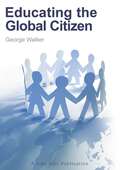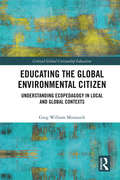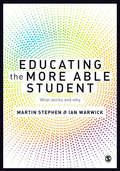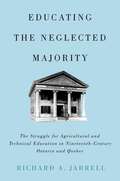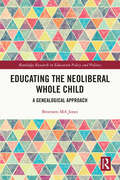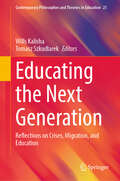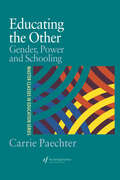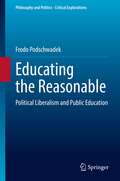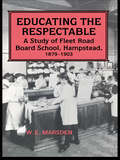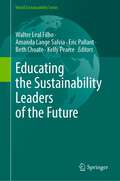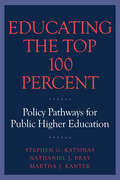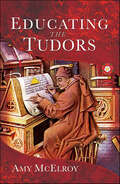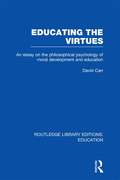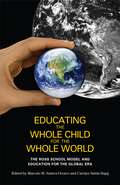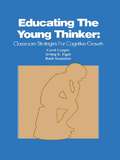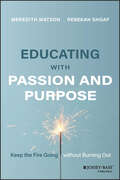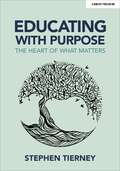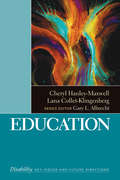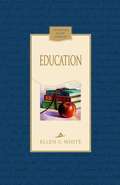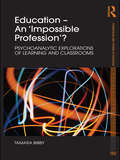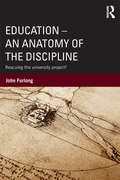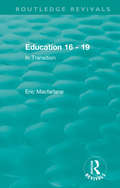- Table View
- List View
Educating the Global Citizen
by George WalkerGlobalization means that no country can afford to ignore what goes on outside its borders. International exchanges are part of everyday life. As a result, international education has been growing at an astonishing rate over the last generation. In Educating the Global Citizen, George Walker examines in-depth the basic concepts of international education: the apparent tension between human diversity and our common humanity; the importance of intercultural understanding; and, the search for a set of universal values to unite humankind.
Educating the Global Citizen
by George WalkerGlobalization means that no country can afford to ignore what goes on outside its borders. International exchanges are part of everyday life. As a result, international education has been growing at an astonishing rate over the last generation. In "Educating the Global Citizen", George Walker examines in-depth the basic concepts of international education: the apparent tension between human diversity and our common humanity; the importance of intercultural understanding; and, the search for a set of universal values to unite humankind.
Educating the Global Environmental Citizen: Understanding Ecopedagogy in Local and Global Contexts (Critical Global Citizenship Education)
by Greg William MisiaszekMisiaszek examines the (dis)connection between critical global citizenship education models and ecopedagogy which is grounded in Paulo Freire’s pedagogy. Exploring how concepts of citizenship are affected by globalization, this book argues that environmental pedagogues must teach critical environmental literacies in order for students to understand global environmental issues through the world’s diverse perspectives. Misiaszek analyses the ways environmental pedagogies can use aspects of critical global citizenship education to better understand how environmental issues are contextually experienced and understood by societies locally and globally through issues of globalization, colonialism, socio-economics, gender, race, ethnicities, nationalities, indigenous issues, and spiritualties.
Educating the More Able Student: What works and why
by Ian Warwick Dr Martin StephenAn unprecedented collaboration between leading names from the independent and state sectors, this thought-provoking book addresses the current crisis in education for the most able. Grounded in the classroom, the authors draw on their own first-hand experiences and international research to scrutinise techniques and practices from leading countries, exploring the more divisive issues that have damaged teaching worldwide. Demonstrating what works well in teaching the most able, and also what does not work, the book offers a radical solution, a stimulus to thought and a way forward for teachers, academics and all those with responsibility for ensuring high standards in education, including governments and members of regulatory authorities. Considering it for your course reading list? Lecturers can order their e-inspection copy!
Educating the More Able Student: What works and why
by Ian Warwick Dr Martin StephenAn unprecedented collaboration between leading names from the independent and state sectors, this thought-provoking book addresses the current crisis in education for the most able. Grounded in the classroom, the authors draw on their own first-hand experiences and international research to scrutinise techniques and practices from leading countries, exploring the more divisive issues that have damaged teaching worldwide. Demonstrating what works well in teaching the most able, and also what does not work, the book offers a radical solution, a stimulus to thought and a way forward for teachers, academics and all those with responsibility for ensuring high standards in education, including governments and members of regulatory authorities. Considering it for your course reading list? Lecturers can order their e-inspection copy!
Educating the Neglected Majority: The Struggle for Agricultural and Technical Education in Nineteenth-Century Ontario and Quebec
by Richard JarrellA history of the heroic and sometimes abortive efforts to provide education for farmers and tradespeople in Victorian central Canada.
Educating the Neoliberal Whole Child: A Genealogical Approach (Routledge Research in Education Policy and Politics)
by Bronwen MA JonesThis book questions what ‘educating the whole child’ means in the context of our current neoliberal education system. In analysing the impact of how education policy is enacted and understood, it examines how this ‘neoliberalisation’ has shaped the personal and ethical relations of education. The book is unique in raising questions about the way in which a common and universally held truth about the importance and value of educating the whole child is conceptualised and articulated in education policy. Employing Foucault’s concepts of bio power, governmentality, the dispositif and subjectivities, this book explores the importance of psy-scientific knowledge, systems of education governance and classroom practices in constructing a neoliberal whole child. It examines how government policy structures the relationship between the child, school and government and claims that current policy and practice operate as forms of bio power that extends neoliberal governance to the emotional and moral life of the child. Educating the Neoliberal Whole Child will be of great interest to researchers, academics and students in the fields of education policy, sociology of education and critical pedagogy. It is also a valuable addition to studies of Foucault and education.
Educating the Next Generation: Reflections on Crises, Migration, and Education (Contemporary Philosophies and Theories in Education #21)
by Tomasz Szkudlarek Wills KalishaThis book offers perspectives on how "education as we know it" is being challenged by the complexity of "nextness" that no longer allows for taking deeply grounded assumptions on the meaning of education as granted. This book interrogates ontological, ethical, and political challenges that immigrant children face. With the global situation in which more and more children are displaced, direct intergenerational transmission is broken, suspended, or complicated and made incoherent, and “things of concern” may be radically different for policymakers, for teachers, students, or their parents. Even the concept of the child as one who needs to be educated before they start participating in adult life cannot be taken for granted in this context. What needs and what can be passed on — and what is worth passing in this context? How do we conceptualize education to encounter newcomers in their realities of being both native and strange, inmate and neighbour or alien, temporal and spatial — and how do we address them all as worth of address? These questions will shine through the authors' reflections on crisis, education, and migration in the complex context of war, climatic catastrophe, displacement, hospitality and institutionalised hostility. This book suggests significant ideas for educational theory and practice responsive to the multi-dimensional crisis of which massive migrations is the most pressing feature in school nowadays.
Educating the Other: Gender, Power and Schooling
by Carrie Paechter Dr Carrie PaechterDespite improvements in girls' relative academic success at the school leaving level, and despite suggestions in the press that boys are now the underachievers, girls remain second-class citizens in education and beyond. This book aims to show how and why girls' education remains subordinated to that of the boys', and to demonstrate how this analysis can be used as a basis for investigating the position of other subordinated groups - such as children from lower socio-economic groups, ethnic minorities, or those with special educational needs. By focusing on what distinguishes the 'normal' from the 'other' says the author, we can begin to call the normal into question and challenge the ideas and assumptions of our educational system.
Educating the Reasonable: Political Liberalism and Public Education (Philosophy and Politics - Critical Explorations #17)
by Frodo PodschwadekOffering the first developed account of political liberal education, this book combines a thorough analysis of the theoretical groundwork of political liberal education with application-oriented approaches to contemporary educational challenges. Following in depth engagement with the shortcomings of Rawls’ theory and addressing some key objections to neutrality-based restrictions in education, the volume moves on to provide an insightful discussion of topics such as same-sex relations in sex-education, the position of migrant children and the rights of religious parents to determine the education of their children. This book outlines a political liberal account of education which provides a useful contribution to the current debates about liberalism and education in a way unprecedented in the literature on political liberalism so far. It is of interest to anyone working at the intersection of political philosophy and philosophy of education as well as for scholars with a broader interest in how liberalism can respond to the challenges of value pluralism.
Educating the Respectable: A Study of Fleet Road Board School, Hampstead
by Professor W Marsden W. E. MarsdenUnder its first headmaster, W.B. Adams, Fleet Road Board School was an outstanding success, described by a contemporary journal as the finest elementary school in Europe.' This study explains the school's success using contemporary sources, and newspapers and the oral evidence of ex-pupils.
Educating the Sustainability Leaders of the Future (World Sustainability Series)
by Walter Leal Filho Amanda Lange Salvia Eric Pallant Beth Choate Kelly PearceThis book focuses on 'educating the sustainability leaders of the future' and will contribute to the further development of this fast-growing field. As the title suggests, it presents practical experiences related to education, research and extension, the so-called third mission, whereby universities conduct outreach to society as a whole (e.g. to local communities, organisations, industry, and other groups) with the aim of documenting such experiences and making them available to a wide audience. This book is produced by the European School of Sustainability Science and Research (ESSSR), through the Inter-University Sustainable Development Research Programme (IUSDRP) and contains inputs from authors from across all geographical regions. It gives a special emphasis to the participation of future generations on sustainability efforts. The book also discusses examples of initiatives coordinated by universities but involving civil society, the private sector, and public sector (including local, national, and intergovernmental bodies). In particular, it describes practical experiences, partnerships, networks, and training schemes for building capacity aimed at fostering the cause of sustainable development at institutions of higher education. Thanks to its design and the contributions by experts from various areas, it provides a welcome contribution to the literature on sustainable development, and it inspires further works in this field.
Educating the Top 100 Percent: Policy Pathways for Public Higher Education
by Nathaniel J. Bray Stephen G. Katsinas Martha J. KanterEducating the Top 100 Percent assesses the decline of higher education funding and offers ambitious policy recommendations to restore the possibility of accessible, affordable education for all.Stephen G. Katsinas, Nathaniel J. Bray, and Martha J. Kanter probe the complex interplay of federal, state, and local policies and illustrate how government actions have, over time, contributed to the long-term slide of US educational attainment. Declining federal and state funding of public higher education has forced institutions to revise their financial models, passing costs directly through to students, to the detriment of prospective students—and the nation. Experts in education policy, the authors point out how the unintended consequences of today's funding model deny an ever-increasing portion of the population important educational and professional opportunities.By providing context for how we arrived at this financial conundrum and analyzing robust quantitative data from national sources, Katsinas and his colleagues offer pragmatic, sustainable, and stable policy options for educating all Americans. The authors provide innovative ideas, key lessons learned, and actionable proposals to fund public higher education. Their top-down federal and bottom-up local and state policy solutions aim to rectify plummeting high school-to-college continuation and college graduation rates. As a result, they present a vision of a brighter economic, cultural, and civic future for educating all Americans.Educating the Top 100 Percent demonstrates how stable, sustainable funding policies can scaffold a better public higher education system for all.
Educating the Tudors
by Amy McElroy“Written with passion and style . . . Veterans of the dynasty and those interested in the social development of learning will be enchanted.” —Stephen Veerapen, author of The Elizabethan Spy ThrillersEducation during the Tudor era was a privilege and took many forms including schools, colleges and apprenticeships. Those responsible for delivering education came from a variety of backgrounds from the humble parish priest to the most famed poet-laureates of the day. Curriculums varied according to wealth, gender and geography. The wealthy could afford the very best of tutors and could study as much or as little as they chose while the poorer members of society could only grasp at opportunities in the hopes of providing themselves with a better future.The Tudors were educated during a time when the Renaissance was sweeping across Europe and Henry VIII became known as a Renaissance Prince but what did his education consist of? Who were his tutors? How did his education differ to that of his elder brother, Prince Arthur, and how did Henry’s education change upon the death of his brother? There is no doubt Henry was provided with an excellent education, particularly in comparison to his sisters, Margaret and Mary. Henry’s own education would go on to influence his decisions of tutors for his own children. Who had the privilege of teaching Henry’s children and did they dare to use corporal punishment?Educating the Tudors seeks to answer all of these questions, delving into the education of all classes, the subjects they studied, educational establishment and those who taught them.
Educating the Virtues: An Essay on the Philosophical Psychology of Moral Development and Education (Routledge Library Editions: Education)
by David CarrTracing the views on moral life of such past philosophers as Plato, Aristotle and Kant, as well as of such theorists as Durkheim, Freud, Piaget and Kohlberg, the author sets forth a full discussion of the nature and educational implications of the idea of moral virtue.
Educating the Whole Child for the Whole World: The Ross School Model and Education for the Global Era
by Carolyn Sattin-Bajaj Marcelo M. Suérez-OrozcoAn examination of new approaches to educating children in a globalized worldAt the dawn of the twenty-first century, we are living in a global era, yet schooling systems remain generally reactive and slow to adapt to shifting economic, technological, demographic, and cultural terrains. There is a growing urgency to create, evaluate, and expand new models of education that are better synchronized with the realities of today’s globally linked economies and societies.Educating the Whole Child for the Whole World examines one such model: the ethos and practices of the Ross Schools and their incubation, promotion, and launching of new ideas and practices into public education. Over the last two decades Ross has come to articulate a systematic approach to education consciously tailored for a new era of global interdependence.In this volume, world-renowned scholars from a variety of disciplines, as well as veteran teachers, administrators, and students, come together to examine some of the best practices in K-12 education in the context of an increasingly interconnected world. Together they explore how the Ross model of education, which cultivates in students a global perspective, aligns with broader trends in the arts, humanities, and sciences in the new millennium.Contributors: Nick Appelbaum, Ralph Abraham, Antonio M. Battro, Sally Booth, Michele Clays, Elizabeth M. Daley, Antonio Damasio, Hanna Damasio, Kurt W. Fischer, Howard Gardner, Vartan Gregorian, Christina Hinton, Hideaki Koizumi, Debra McCall, Carolyn Sattin-Bajaj, John Sexton, Carola Suárez-Orozco, Marcelo M. Suárez-Orozco, William Irwin Thompson, and Sherry Turkle
Educating the Young Thinker: Classroom Strategies for Cognitive Growth
by C. Copple I. E. Sigel R. SaundersPublished in the year 1984, Educating the Young Thinker is a valuable contribution to the field of Cognitive Psychology.
Educating with Passion and Purpose: Keep the Fire Going without Burning Out
by Rebekah Shoaf Meredith MatsonStay engaged with your purpose to better serve your students—and yourself In an era of sky-high burnout, Educating with Passion and Purpose gives veteran educators everything they need to thrive in their profession. This book will help you avoid the disenchantment and frustration that can come from doing the difficult work of K-12 education. You are in this field because you want to make a difference, but you often lack the support you need to do that amid overwhelming demands. Experienced educators themselves, authors Meredith Matson and Rebekah Shoaf speak the truth about what today’s teachers confront—and how you can navigate the changing landscape to face the challenges and opportunities we encounter. Inside, you’ll find frequent opportunities for self-reflection on the topics that matter most to educators, including race, privilege, wellbeing, mentorship, and how to rise to the social–emotional demands that teaching asks. At a time when many teachers are leaving the field within the first years of their careers, Educating with Passion and Purpose offers you a way forward, so you can nurture your students and professional self. Gain perspective on why you teach and what matters most to you in your career Explore how race and identity impact interactions in your classroom Learn practical strategies for protecting your social and emotional energy and seeking help Find a new sense of inspiration in your teaching practice with hands-on activities and toolsThis book is perfect for educators with three or more years of experience. It also offers crucial insights for pre-service educators, staff developers, and experienced teachers looking for ways to avoid career burnout and other pitfalls traditional teacher-training programs did not prepare them.
Educating with Purpose: The heart of what matters
by Stephen TierneyIf the last decade focused on what works, the decade ahead must focus on what matters. In his second book, Tierney argues that the purpose of education must move to the heart of the educational debate. Purpose will significantly influence what schools and the education system as a whole will do next. Why we educate is a question from which all other aspects evolve. A question for all times, it will resonate with those who have experienced the Great Pause. Using four main philosophies of education - personal empowerment, cultural transmission, preparation for work and preparation for citizenship - he provides the underpinning theory and seminal works alongside a powerful critique. Using the impact of these different philosophies on a school's curriculum he challenges the current orthodoxy, allowing the reader to consider alternative views and approaches. Proposing that the telos of education must be a life well lived, he argues for a re-purposing of education, with a preferential option for the poor at its heart. Educative and challenging this will be read by all those interested and involved in education.
Educating with Purpose: The heart of what matters
by Stephen TierneyIf the last decade focused on what works, the decade ahead must focus on what matters. In his second book, Tierney argues that the purpose of education must move to the heart of the educational debate. Purpose will significantly influence what schools and the education system as a whole will do next. Why we educate is a question from which all other aspects evolve. A question for all times, it will resonate with those who have experienced the Great Pause. Using four main philosophies of education - personal empowerment, cultural transmission, preparation for work and preparation for citizenship - he provides the underpinning theory and seminal works alongside a powerful critique. Using the impact of these different philosophies on a school's curriculum he challenges the current orthodoxy, allowing the reader to consider alternative views and approaches. Proposing that the telos of education must be a life well lived, he argues for a re-purposing of education, with a preferential option for the poor at its heart. Educative and challenging this will be read by all those interested and involved in education.
Education
by Cheryl Hanley-Maxwell Lana Collet-KlingenbergThis volume in The SAGE Reference Series on Disability explores education issues for people with disabilities and is one of eight volumes in the cross-disciplinary and issues-based series, which examines topics central to the lives of individuals with disabilities and their families. With a balance of history, theory, research, and application, specialists set out the findings and implications of research and practice for others whose current or future work involves the care and/or study of those with disabilities, as well as for the disabled themselves. The concise, engaging presentational style emphasizes accessibility. Taken individually, each volume sets out the fundamentals of the topic it addresses, accompanied by compiled data and statistics, recommended further readings, a guide to organizations and associations, and other annotated resources, thus providing the ideal introductory platform and gateway for further study. Taken together, the series represents both a survey of major disability issues and a guide to new directions and trends and contemporary resources in the field as a whole.
Education
by Ellen G. WhiteDiscover the secret to true education as your eyes travel over these vital principles recognizing God as Source and Teacher. Understand where many have failed, and live the truth that makes us free. Looking to obtain an advanced degree in Education? Gain fresh insight into the source of all learning and knowledge. Great instruction for those who teach others or for personal development. The book, Education, is a must read for any serious student of life.
Education - An 'Impossible Profession'?: Psychoanalytic Explorations of Learning and Classrooms (Foundations and Futures of Education)
by Tamara BibbyIn classrooms and lectures we learn not only about academic topics but also about ourselves, our peers and how people and ideas interact. Education – An Impossible Profession extends the ways in which we might think about these processes by offering a refreshing reconsideration of key educational experiences including those of: being judged and assessed, both formally and informally adapting to different groups for different purposes struggling to think under pressure learning to recognise and adapt to the expectations of others. This book brings psychoanalysis to new audiences, graphically illustrating its importance to understandings of teaching, learning and classrooms. Drawing on the author’s original research, it considers the classroom context, including policy demands and professional pressures, and the complexity of peer and pedagogic relationships and interactions asking how these might be being experienced and what implications such experiences might have for learners and teachers. The discussions will be of interest not only to teachers, leading-learners and teacher-educators, but also to individuals interested in education policy, professional practice and theories of education.
Education - An Anatomy of the Discipline: Rescuing the university project?
by John FurlongEducation – An Anatomy of the Discipline focuses on the development of the discipline of education, how it is understood and practised in contemporary universities, and the potential threats to its future. As the author, John Furlong argues, disciplines are not only intellectually coherent fields of study; they also have a political life, they are argued for, supported, challenged and debated. Nowhere is this more true than in the discipline of education. In this authoritative text, Furlong describes the history as well as the current state of the discipline of education in universities. He also explores the range of national and global changes that have helped to shape the discipline in recent years. Education’s final ‘arrival’ in the university sector coincided with major changes in universities themselves. Today, universities are very diverse institutions: they no longer have a sense of essential purpose and have largely accepted their loss of autonomy, especially in education where government intervention is particularly strong. If education is now fully integrated into universities, then, like the system as a whole, it urgently needs to find a voice, set out a vision for itself, and state what its purpose should be within a university in the modern world. The book therefore brings together four vitally important topics: -the changing nature of the university-the academic and scholarly study of education as a field -the professional education and training of teachers -the nature and organisation of educational research. Education – An Anatomy of the Discipline will occupy a central place in contemporary literature about education; although based on evidence from British universities, its implications are important across the world. The book will be invaluable reading for all professionals working in university departments and faculties of education as well as those with an interest in the changing role of the university in contemporary society.
Education 16 - 19: In Transition (Routledge Revivals)
by Eric MacfarlanePublished in 1993, this book considers the needs of older teenage students and the various forms of provision made for them. The 16-19 sector of education is a transition stage for students and a system in transition for educators. At a time of rapid change the author assesses the significance of current trends and recent legislation for managers, teachers and lecturers in schools and colleges catering for this age group. Eric Macfarlane argues that the 16-19 sector provides both a microcosm and intensification of the tensions, divisions and conflicting aims and objectives present throughout the education system as a whole. He explores the differences that exist between the academic and vocational routes to qualification, between the comprehensive, selective and independent systems and between ‘traditional’ and ‘progressive’ approaches to the learning process. The ideologies and policies that have produced the present system are traced and the case for reform examined. Different management tasks in 16-19 education are considered, with emphasis on current changes in strategies and structures. The book highlights the distinctive features of the various types of institution that provide for students aged 16-19 and the ways in which these distinctions are becoming blurred. The final chapters consider the future of 16-19 provision and the particular impact of the 1992 Further and Higher Education Act.
